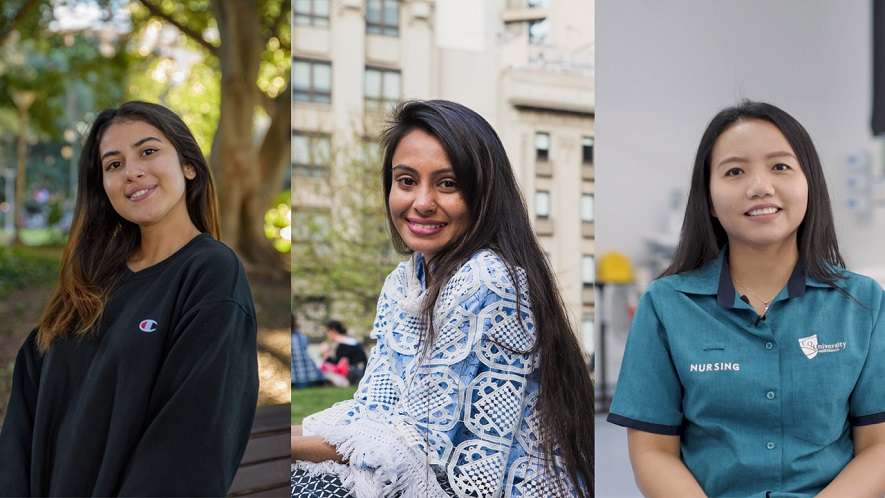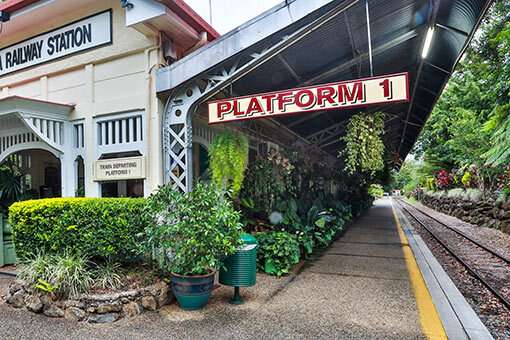Life in Australia

Australia is a diverse and multicultural country. Get ready to experience a mix of cultures, languages, and traditions that make life here exciting and unique.
Australia’s story begins with its First Nations peoples, the Aboriginal and Torres Strait Islander communities who have lived here for over 40,000 years. Today, Australia is home to people from all over the world, creating a vibrant and diverse society.
From bustling city life to stunning beaches and natural landscapes, your experience will depend on where you study. Melbourne offers arts and coffee culture, Sydney has iconic beaches, and Brisbane, Cairns and Rockhampton bring sunshine and outdoor living.
The unique mix of cultures, food, languages and religious backgrounds, directly influence Australia’s culture and values. The sections below will also provide you with important information that will help you adjust to living and studying in Australia.
If you have any questions, please contact the Student Service SPOT team on your campus.
Living costs in Australia can vary depending on where you live, your accommodation choice, and your lifestyle. Shared housing is usually the most budget-friendly option, while inner-city living tends to be more expensive than outer suburbs or regional areas.
To help you plan ahead, the Australian Government Department of Home Affairs sets minimum financial requirements for student visas. These figures are designed to ensure you can cover basic living expenses while studying.
- Primary applicant – A$29,710
- Partner/spouse of primary applicant – A$10,394
- Dependent child – A$4,449
Use these amounts as a guide when creating your budget as they’re a good starting point for estimating what you’ll need. Additionally, we’ve put together a simple guide to average living costs across different cities. These figures are estimates only and may change over time.
Typical weekly expenses
| Expense | Brisbane (A$) | Melbourne (A$) | Rockhampton (A$) | Sydney (A$) |
|---|---|---|---|---|
| Accommodation (shared house) | 207 | 234 | 216 | 247 |
| Accommodation (one-bedroom unit) | 457 | 442 | 456 | 462 |
| Accommodation (homestay) | 370 | 410 | 360 | 410 |
| Groceries and eating out | 105 – 307 | 245 – 332 | 167 – 387 | 145 – 307 |
| Public transport (based on ten trips) | 5 | 55 | 5 | 50 |
| Electricity and gas | 25 – 40 | 10 – 20 | 27 – 54 | 25 – 40 |
| Phone and Internet | 16 – 24 | 16 – 24 | 16 – 24 | 16 – 24 |
| Car (after purchase) | 105 | 105 | 142 | 105 |
| Entertainment | 50 –150 | 80 –150 | 35 –130 | 80 –150 |
For more information on the cost of living in Australia and for tips on creating a budget, please visit the following helpful websites:
The Insider Guides provides a helpful online Cost of Living Calculator to estimate your weekly, monthly and yearly living expenses.
The Australian Government website, Money Smart provides helpful information on managing finances in Australia.
The Study in Australia website has some excellent resources and is available in multiple languages.
For currency conversion, please visit xe.com.
The climate in Australia varies widely. The northern part of Australia tends to have quite a tropical climate with hot and humid summers and warm and dry in the winter. The Southern part tends to have mild summers and cold and rainy winters. Snow is rare but does fall in some regions.
The average temperatures in degrees Celsius (oC), in the cities where our campuses are located.
Summer (Dec – Feb) | Autumn (Mar – May) | Winter (Jun – Aug) | Spring (Sep – Nov) | |
|---|---|---|---|---|
| Adelaide, SA | 15 – 26 | 12 – 22 | 7 – 16 | 11 – 21 |
| Brisbane, QLD | 21 – 30 | 17 – 27 | 18 – 22 | 16 – 27 |
| Bundaberg, QLD | 24 – 30 | 17 – 27 | 11 – 22 | 16 – 27 |
| Cairns, QLD | 24 – 31 | 22 – 29 | 17 – 26 | 21 – 29 |
| Gladstone, QLD | 23 – 30 | 19 – 28 | 13 – 19 | 18 – 28 |
| Mackay, QLD | 23 – 30 | 19 – 27 | 12 – 23 | 18 – 28 |
| Melbourne, VIC | 13 – 26 | 10 – 20 | 6 – 14 | 9 – 19 |
| Rockhampton, QLD | 22 – 32 | 18 – 28 | 10 – 24 | 17 – 29 |
| Sydney, NSW | 19 – 26 | 14 – 23 | 8 – 18 | 13 – 22 |
| Townsville, QLD | 24 – 31 | 20 – 29 | 14 – 26 | 20 – 29 |
Source: Australian Bureau of Meteorology.
Australians love the great outdoors. There are parks everywhere and most of them will have free barbecues. Major beaches will have lifeguards and surf rescue teams and you can find small and well-kept camping grounds hundreds of kilometres from anywhere. The cities are easy to get out of so you can move from urban to 'bush' in under an hour and a couple of hours later you'll be in the 'outback'.
There is no shortage of culture with fantastic museums and galleries, a thriving theatre and music scene and fantastic restaurants and coffee.
Sporting events bring the nation together whether it is AFL Grand Final Day, the Australian Open tennis, the State of Origin rugby or the Bells Beach Surfing competition, to name a few.
Safety and adventure
Australia is a safe place to study and live and is ranked among the safest countries in the world. But like any country you need to be aware of your surroundings and take precautions.
Travelling in groups and avoiding public transport late at night are common sense approaches to living anywhere. We have a visible and very approachable police force ensuring that the streets are kept safe.
We also have an abundance of wildlife off our coasts and in the bush that can sting or bite so it is worth familiarising yourself with the hazards in the environment you will be in.
Australia is a land for the adventurer so if you are going to go scuba diving, trekking in the outback, climbing mountains, camping in the bush or clubbing till dawn you need to take necessary precautions. We'd recommend talking to locals to find out about local conditions. If you respect your surroundings Australia will repay you with life-long memories.
You can find more information on our Health and Safety page.
Wildlife and landscape
You will leave Australia missing the smell of eucalyptus trees, the screech of a cockatoo or the serene image of a kangaroo hopping along the beach. Besides the kangaroos, koalas and crocodiles, there are huge numbers of more unusual animals like echidnas, platypus, cassowaries and bilbies.
We strongly recommend you get a travel guide like the Lonely Planet or a copy of Australian Geographic which will give you an insight into the abundance of wildlife and a variety of landscapes you can experience while here.
Australia is also home to 20 UNESCO World Heritage sites, from the Great Barrier Reef in Queensland to the Blue Mountains in New South Wales to the various Australian Convict Sites located throughout Australia, to name a few.
Unlike any other university in Australia, CQUniversity has campuses across the country, each giving students a uniquely Australian experience. You can choose to study at more than one campus and mix the urban with the regional, hot with cool, tropical with temperate or whatever suits your academic and personal interests.
You can find more information on Your Campus page.
 “
“I've always wanted to be an accountant because I really enjoyed maths and was interested in economics. Applying to study at CQU was quick and smooth, and I also received credits from my previous studies!
Sara Manka
Bachelor of Accounting | Albania

